Navigating the path to that glow-up with a richer skin palette?
Darker skin tones boast a captivating beauty, but the journey to achieving and maintaining radiant skin can feel a tad bit like a quest for the Holy Grail.
Uneven skin tone and ever-so-stubborn hyperpigmentation are common skin concerns that often lead to the quest for clear and glowing skin.
While many people opt for a targeted skincare routine, it’s important to remember that a good face wash can be the first line of defence.
Yes! The humble face wash, often underestimated, can actually make a big difference in achieving healthy and radiant skin, but finding the right one?
That’s where we come in!
In this comprehensive guide, we’ll explore the world of face washes specially formulated for those with darker skin tones, addressing hyperpigmentation and uneven skin tone concerns.
But First, What Is Hyperpigmentation?
Hyperpigmentation is a common skin condition that affects individuals of all skin tones, but it can have unique effects on people with darker skin tones.
Hyperpigmentation occurs when patches of skin become darker than the surrounding area, usually due to an increase in melanin production.
YOU MIGHT LIKE THESE TOO:
- 6 Best Korean Products For Hyperpigmentation
- Niacinamide For Hyperpigmentation: Does It Work?
- How Salicylic Acid Can Transform Your Skin
One of the primary concerns for individuals with darker skin tones is post-inflammatory hyperpigmentation (PIH).
PIH occurs when the skin produces excess melanin in response to inflammation or injury, such as acne, cuts, or burns.
Because darker skin already contains higher levels of melanin, the pigmentation changes caused by PIH can be more pronounced and take longer to fade compared to individuals with lighter skin tones.
Hyperpigmentation vs Melasma

Another form of hyperpigmentation that affects darker skin tones is melasma.
Melasma is characterised by brown or grey-brown patches on the face, typically triggered by hormonal changes, such as pregnancy or the use of hormonal contraceptives.
Darker skin tones are more prone to melasma due to the higher levels of melanin present in the skin.
This is because “they have more melanocytes than people with lighter skin do”, according to Medical News Today. Melanocytes are cells in the skin that produce and maintain the pigment called melanin.
The patches can be particularly challenging to treat and may require a combination of topical treatments, laser therapy, and diligent sun protection.
Furthermore, the methods traditionally used to treat hyperpigmentation, such as chemical peels or laser treatments, can be riskier for individuals with darker skin tones.
These treatments may cause post-inflammatory hyperpigmentation or hypopigmentation (lightening of the skin).
What Causes Hyperpigmentation?

Hyperpigmentation can be triggered by various factors, but, according to a study, the leading factors are “trauma to the skin, medication, hormones, and sun exposure can cause hyperpigmentation.”
How To Prevent Hyperpigmentation
While hyperpigmentation can sometimes be difficult to prevent completely, there are several measures you can take to minimise its occurrence or severity.
Protect your skin from the sun: Sun exposure is one of the leading causes of hyperpigmentation. Elizabeth Barbalic, founder and CEO of Antipodes tells Glamour “SPF is absolutely crucial – it helps to prevent hyperpigmentation and dark spots, and can also help to fade existing ones.” To prevent it, always wear sunscreen with a high SPF (30 or above) when going outdoors, even on cloudy days.
Use skincare products with brightening agents: Incorporate skincare products that contain ingredients like vitamin C, niacinamide, kojic acid, and licorice extract. These ingredients can help lighten existing hyperpigmentation and prevent new ones from forming. Look for serums, creams, or masks that specifically target hyperpigmentation.
Avoid picking or scratching at the skin: Picking at acne, scabs, or any other skin irritation can lead to post-inflammatory hyperpigmentation. To prevent this, resist the temptation to pick or scratch, as it can worsen the discolouration, making it more difficult to fade.
Maintain a consistent skincare routine: Consistency is key when it comes to preventing hyperpigmentation. Establish a daily skincare routine that includes gentle cleansing, exfoliation (to remove dead skin cells), and moisturisation. This helps maintain an even complexion and promotes healthier skin.
Be cautious with hair removal methods: Certain hair removal techniques, such as waxing or shaving, can cause skin inflammation and subsequent hyperpigmentation. If you notice darkening after hair removal, consider alternative methods like laser hair removal or using hair removal creams specifically formulated for sensitive skin.
Consult a dermatologist: If you have persistent or severe hyperpigmentation, it’s best to consult a dermatologist. They can evaluate your skin condition and provide personalised advice or treatments, such as chemical peels, microdermabrasion, or prescription creams.
RELATED:
- 11 Best Sunscreens For Hyperpigmentation
- How Kojic Acid Can Improve Hyperpigmentation & Dark Spots
- 6 Best Korean Products For Hyperpigmentation
Ingredients To Consider When Choosing Face Wash For Hyperpigmentation
When tackling hyperpigmentation, it’s essential to consider a face wash with brightening agents such as azelaic acid, kojic acid and vitamin C – all of which block the enzyme tyrosinase which is known to inhibit melanin production.
Peptides are crucial for fading hyperpigmentation. Daniel Isaacs, formulator and development director at Medik8 tells Bazaar, “Peptides are short chains of amino acids that act as the building blocks of proteins, including collagen and elastin,” but they are hyperpigmentation superstars too!
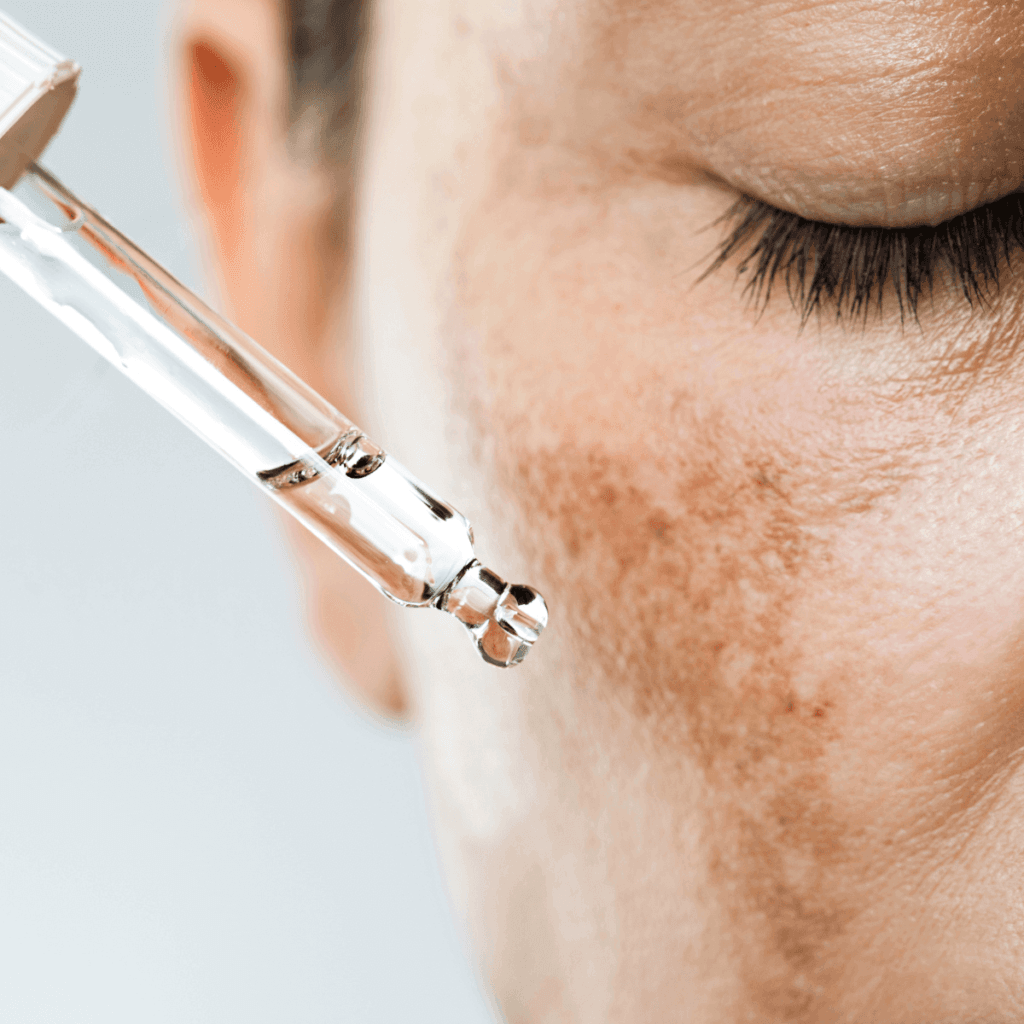
While research on the specific effects of peptides on hyperpigmentation is ongoing, some peptides have shown benefits such as melanin regulation, reduced inflammation, collagen stimulation, cellular repair and antioxidant activity.
Another ingredient you need to know about is retinol! Retinol has proven time and time again that is a key player in cell turnover (removing dead cells), in fact, according to a study, it can reduce pigmentation by about 60%.
Like retinol, glycolic acid and salicylic acid are also touted for their exfoliating benefits, increasing the rate at which excess pigment in the skin can be removed, however, excess exfoliating can make hyperpigmentation worse so be careful!
Dr Erum Ilyas, MD, board-certified dermatologist tells Glamour “Exfoliation can play a role in managing hyperpigmentation but there is a need to strike a balance, as excess exfoliation can also contribute to excess pigmentation.”
NOTE: Stay far away from harsh ingredients like alcohol and sulfates should be avoided as they can trigger an inflammatory response, leading to more pigmentation issues.
Top 5 Face Washes for Hyperpigmentation on Darker Skin Tones
1. CeraVe Hydrating Cleanser

Why It’s Great:
Got dry skin? The award-winning CeraVe Hydrating Facial Cleanser is your go-to. Its superstar ingredients include hyaluronic acid and ceramides, which work together to maintain your skin’s natural moisture and strengthen its barrier. This gentle cleanser won’t aggravate hyperpigmentation and is perfect for sensitive skin.
Why You’ll Love It:
- Hydrates and protects with hyaluronic acid and ceramides
- Gentle formula ideal for sensitive skin
- Non-stripping and non-irritating
Non-comedogenic so it won’t clog your pores
Customer Review:
“The absolute best facial cleanser I’ve used. Effectively washes off my makeup and leaves my face feeling clean. Easy to travel with and it really is scent-free. Only cleanser I’ll use in my skincare routine.”
2. La Roche-Posay Toleriane Purifying Foaming Cleanser
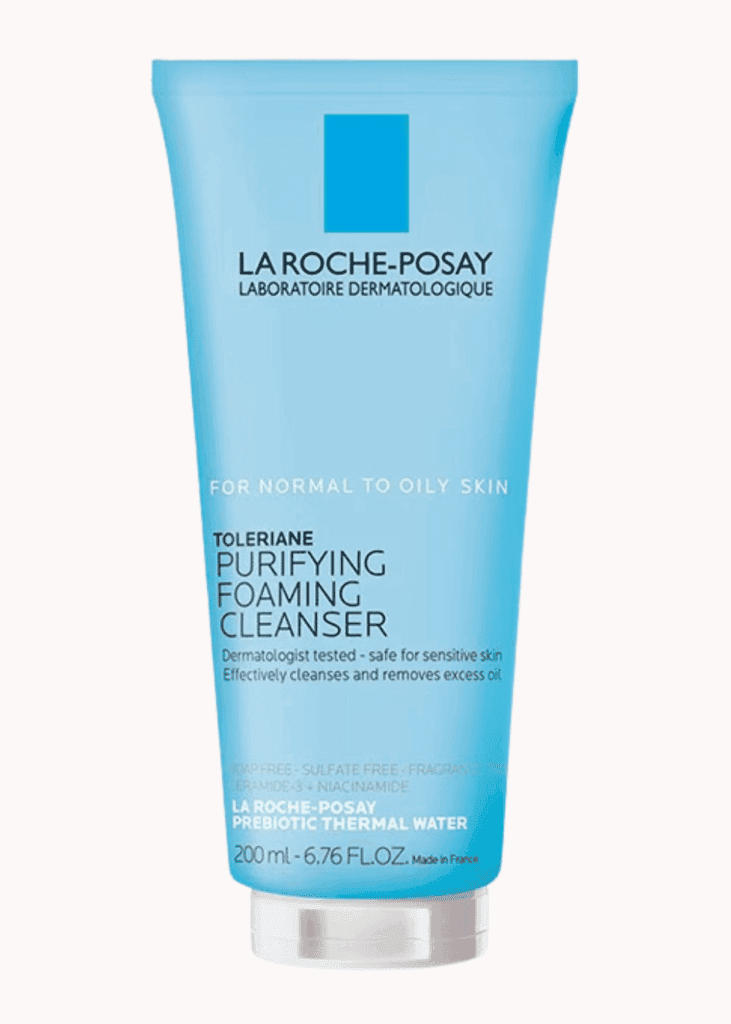
Why It’s Great:
If you’re dealing with oily or combination skin, this cleanser is a game changer. The La Roche-Posay Toleriane Purifying Foaming Cleanser removes excess oil and impurities without drying out your skin. With thermal spring water and glycerin, it keeps your skin balanced and hydrated.
Why You’ll Love It:
- Cleanses deeply while maintaining skin’s pH balance
- Soothes and hydrates with thermal spring water
- Ideal for oily or combination skin
Customer Review:
“This is a wonderful face wash very gentle yet cleans face well. I do not wash my eyes with this though as most cleansers are not to be used on the eyes. And my eyes are very sensitive and dry so there’s that. But other than that this is an excellent product.”
3. Ava Estell Foaming Face Cleanser
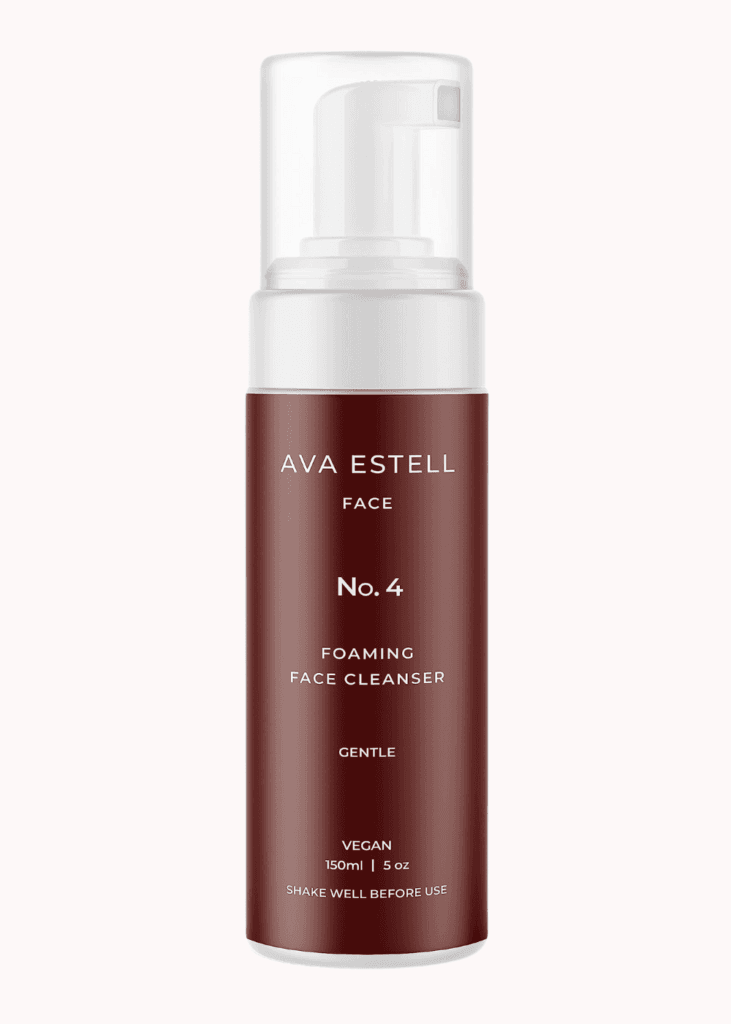
Why It’s Great:
The Ava Estell Foaming Face Cleanser is a powerhouse for those dealing with hyperpigmentation. This luxurious foam cleanser gently removes impurities while targeting dark spots and uneven skin tone. Infused with natural ingredients, it’s designed to cleanse deeply without stripping your skin of essential moisture.
Why You’ll Love It:
- Gentle yet effective foaming action
- Brightens and evens out skin tone
- Hydrates while cleansing
Customer Review:
“I’ve only been using these products for 3 weeks and am astounded! These products don’t overpower or dry out my sensitive skin. My hyperpigmentation marks have lightened significantly. I am so excited to see what my skin looks like in another 6 weeks!”
4. Dr. Barbara Sturm Darker Skin Tones Foam Cleanser

Why It’s Awesome:
The Dr. Barbara Sturm Darker Skin Tones Foam Cleanser is specially formulated to address the unique needs of darker skin tones. This foam cleanser balances your skin’s natural oils while gently exfoliating to reveal a brighter, more even complexion. It’s perfect for those with sensitive skin looking for a gentle yet effective solution for hyperpigmentation.
Why You’ll Love It:
- Specifically designed for darker skin tones
- Gently exfoliates and brightens
- Calms and hydrates with soothing ingredients
Customer Review:
“My favourite cleanser by far. In combination with a few other key products, has been a game changer for my hyperpigmentation issues.”
5. Murad Environmental Shield Essential-C Cleanser
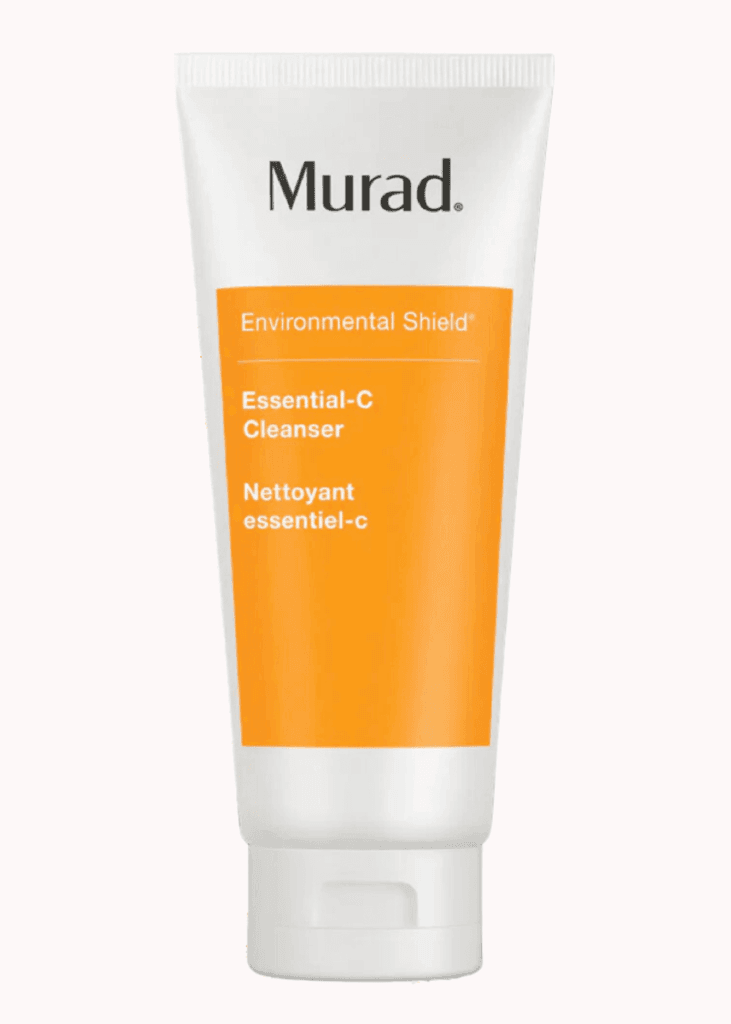
Why It’s Awesome:
Murad’s Environmental Shield Essential-C Cleanser is a powerhouse when it comes to protecting your skin from environmental damage and brightening hyperpigmentation. Infused with Vitamin C and other potent antioxidants, it defends against pollution while giving your skin a radiant glow.
Why You’ll Love It:
- Protects against environmental stressors
- Brightens and refines skin texture
- Provides antioxidant benefits for healthier skin
Customer Review:
“This product is absolutely amazing! The vitamin C gives me such a nice glow and I’ve had compliments that my skin looks so fresh! It also smells like chocolate orange to me even though there is no chocolate mentioned.. absolutely amazing!”
Incorporating A Face Wash For Hyperpigmentation Into Your Skincare Routine
To make the most out of your face wash, it’s important to complement it with a good overall skincare routine.
Begin with a gentle, circular massage of the face wash onto damp skin, allowing the product to work for about one minute before rinsing.
Follow up with a toner like Medik8’s Daily Refresh Balancing Toner to ensure that your skin’s pH levels are rebalanced and ready for the treatments to come.
Finish off with a brightening moisturiser or serum such as Murad’s Rapid Dark Spot Correcting Serum to lock in hydration and protect your newly cleaned and treated skin.
Extra Tips for Managing Hyperpigmentation
1. Consistency is Key:
Stick with your chosen face wash and other hyperpigmentation treatments to see the best results. Regular use is crucial for achieving and maintaining a more even skin tone.
2. Never Skip Sunscreen:
Daily application of sunscreen is essential to prevent further dark spots and protect your skin from UV damage. Make it a staple in your skincare routine.
3. Stay Hydrated:
Hydration is crucial for skin health. Use moisturisers with hyaluronic acid to keep your skin plump and support its repair processes.
4. Patch Test New Products:
Always patch-test new products before incorporating them into your routine to ensure they’re suitable for your skin type and won’t cause irritation.
Save on Pinterest for later?
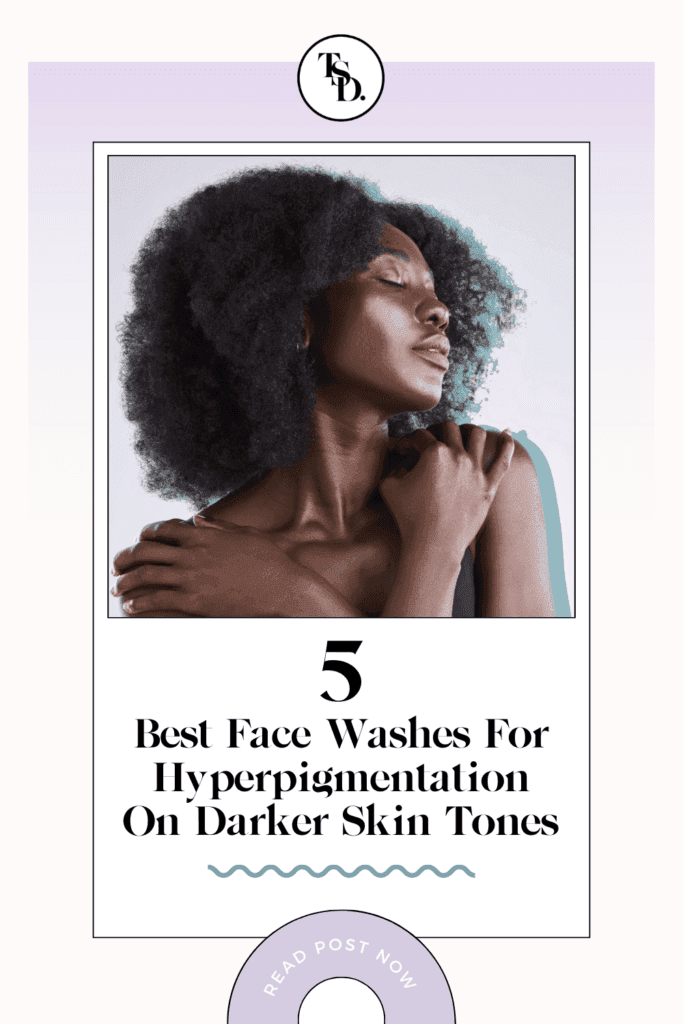








This content is pure gold! Thanks for the great article.